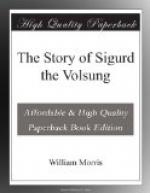And the Volsung bids men dight them to cross the sea-flood o’er,
Lo, how there cometh the tidings of measureless mighty hosts
Who are gotten ashore from their long-ships on the skirts of King Eylimi’s
coasts.
Sore boded the heart of the Isle-king
of what the end should be.
But Sigmund long beheld him, and he said:
“Thou deem’st of me
That my coming hath brought thee evil;
but put aside such things;
For long have I lived, and I know it,
that the lives of mighty kings
Are not cast away, nor drifted like the
down before the wind;
And surely I know, who say it, that never
would Hiordis’ mind
Have been turned to wed King Lyngi or
aught but the Volsung seed.
Come, go we forth to the battle, that
shall be the latest deed
Of thee and me meseemeth: yea, whether
thou live or die,
No more shall the brand of Odin at peace
in his scabbard lie.”
And therewith he brake the peace-strings
and drew the blade of bale,
And Death on the point abided, Fear sat
on the edges pale.
So men ride adown to the sea-strand, and
the kings their hosts array
When the high noon flooded heaven; and
the men of the Volsungs lay,
With King Eylimi’s shielded champions
mid Lyngi’s hosts of war,
As the brown pips lie in the apple when
ye cut it through the core.
But now when the kings were departed,
from the King’s house Hiordis went,
And before men joined the battle she came
to a woody bent,
Where she lay with one of her maidens
the death and the deeds to behold.
In the noon sun shone King Sigmund as
an image all of gold,
And he stood before the foremost and the
banner of his fame,
And many a thing he remembered, and he
called on each earl by his name
To do well for the house of the Volsungs,
and the ages yet unborn.
Then he tossed up the sword of the Branstock,
and blew on his father’s horn,
Dread of so many a battle, doom-song of
so many a man.
Then all the earth seemed moving as the
hosts of Lyngi ran
On the Volsung men and the Isle-folk like
wolves upon the prey;
But sore was their labour and toil ere
the end of their harvesting day.
On went the Volsung banners, and on went
Sigmund before,
And his sword was the flail of the tiller
on the wheat of the
wheat-thrashing
floor,
And his shield was rent from his arm,
and his helm was sheared from his
head:
But who may draw nigh him to smite for
the heap and the rampart of dead?
White went his hair on the wind like the
ragged drift of the cloud,
And his dust-driven, blood-beaten harness
was the death-storm’s angry
shroud,
When the summer sun is departing in the
first of the night of wrack;
And his sword was the cleaving lightning,
that smites and is hurried aback
Ere the hand may rise against it; and
his voice was the following thunder.




